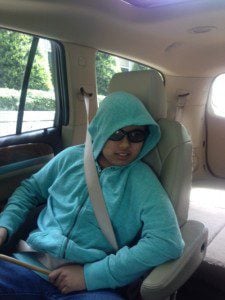
Allah pai bharosa reko. (Place your trust in God.)
The mornings feel less hectic now.
Don’t get me wrong, they still are hectic, as we rush to the end of the school year. I am urging Hamza to wake and hurry, hurry, hurry through the teeth brushing, clothes changing, socks and shoes wearing and breakfast eating. I still am frantically urging him and his sister – Come on come on! Let’s go, let’s go, let’s go!
Until, in a flurry of arms, legs, backpacks, lunch boxes and extra bags carrying end-of-school-year projects, they are out the door with their father.
And the house quiets down, and I put stuff back into the fridge, pile dishes into the sink and wipe the crumbs off the counter before I gear up for round two – upstairs I hear Lil D rustling and making noises in his bedroom, awake because I have turned off his noise machine, pushed back the curtains and have opened the door to let the noises of the morning rush filter into his room.
Now it’s just Lil D and me, as I help him through his morning routine. Some days we move at a brisk, efficient clip. Other days, when he is cranky and crying, we wait it out until he is in a better place, breakfast is eaten and we are ready to head out to school.
After nine years of riding the yellow school bus, we’ve said good bye. No more. No more trying to make it work, no more rushing through the morning to make it on time to the bus. No more half-eaten breakfast and meds being administered at the door before we walk out to the bus. No more relying on the bus aide and driver to inform me of how Lil D was and if they were able to keep him safe when he became upset and engaged in self-injury. No more.
But also, no more dream of Lil D being able to calmly ride the bus, which was a hopeful precursor to him being able to take some sort of public transportation on his own as an adult. No more ongoing goal of independent bus riding. Nine years. Nine years we tried, him wrestling with all that was so very challenging for him, and me constantly worried and in constant communication with his driver and aide, with his teachers at school trying to make it work.
Because that is life with Lil D and his autism – knowing when to walk away, even if it’s nine years later, and if at all possible, no regrets.
Allah pai bharosa reko. (Place your trust in God.)
I want Lil D to advocate for himself. I want it so badly. I want him to be able to let us know what he wants, what works for him, what doesn’t work, what he is willing to try and what is non-negotiable. I want to know — as much as any parent can know what their child wants for himself, what his learning style is and what his preferences are. But it’s so much more than that
(And he does let us know, in so many nonverbal yet communicative ways. We measure his actions and reactions, and we pay attention to his triggers and stressors. We push him in ways we think he should be pushed, and we retreat when we know it’s beyond him.)
As his parents, we are fallible. All parents are, but the stakes feel so, so, so much more higher for Lil D. When we make a decision that we think is good for him — and it isn’t – he deals with the fallout. And that sits on my head and shoulders, causing a dull ache that I cannot shake. No parent wants to do wrong by their child. But when we do so, well it’s unbearable.
It was this sentiment I tried to convey to Lil D’s IEP (individual education plan) team at our last two meetings. I had called for an emergency IEP to discuss recent difficult medical issues Lil D had developed, to ask for assessments, more services and changes to his transportation for the sake of his safety and comfort.
As we talked across the table, I felt the sympathy and commitment from the team to do right by our son. We’ve argued, agreed and disagreed, and have had fundamental differences regarding his education. But we’ve worked in harmony as well. We’ve sat in meeting after meeting for years, going back and forth over how much speech and occupational therapy he qualifies for, what school and educational setting is best for him, what kind of inclusion we can try and what kind of academic, social, behavioral, life skills and communications goals he should be working on.
But at times I feel that everyone forgets who we are doing this for – Lil D. A very real person who has to live by the supports, goals, assessments, behavior intervention plans and other paraphernalia we put in place for him. When I put forth my opinion on something I think will be good for my son, it’s the job of others on the team to assess that opinion from all angles and then decide what data should be taken, what evaluations need to be made and what should be done.
It’s all supposed to be for his best educational benefit. But do we realize the impact of our decisions?
Please realize, I said to the team at a recent meeting while fighting back tears, that we are making very important, life-affecting decisions for a 13-year-old boy. A boy who isn’t here, who has never verbally told us what works and doesn’t work for him. When we roll the dice and try something with him, we need to be as sure as we can be that this is the right thing. Because if it backfires, only he will be hurt. Not you, not me.
Allah pai bharosa reko. (Place your trust in God.)
This is the advice I have been given time and time again from everyone around me. And it’s good advice – advice I try and follow. But I have a request back to God – Put Your trust in me. Make me believe in that trust. Help me trust myself to do right by my child.
And make our decisions be the right ones.












